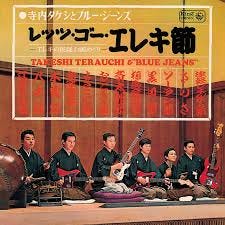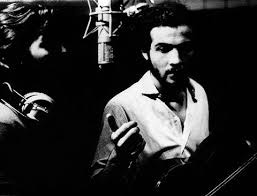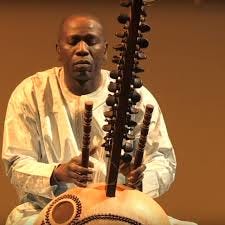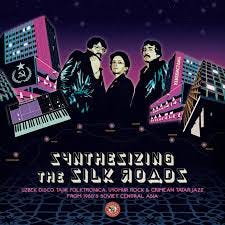Every Record is a Rabbit Hole
Notes from a quick browse of archival titles in the World section on Bandcamp Friday
This roundup features four titles I encountered through a quick scan of Bandcamp’s “World” menu of recent backcatalog releases on a single day (Bandcamp Friday!) last week. The goal was to replicate the record-store browsing experience – encountering music I hadn’t heard, away from the constant algorithmic filtering and social media marketing around hotness or “emerging trends.” Not gonna lie: This sometimes meant stopping at wild cover art or intriguing album titles. Curiousity thus activated, I’d press Play to hear the ”emphasis” track and decide from there whether to listen to the full program.
It’s fun. It doesn’t cost a ton – and might make a difference to a struggling artist. And it reminds that as troubled as the world currently is, there are and have always been gifted humans trying to turn it around, through sound.
Takeshi Terauchi & Blue Jeans: Let's Go Eleki Bushi (1966). The guitarist Takeshi Terauchi first tasted fame in January 1965, when his band backed Yuya Uchida to open for the Ventures during the surf-rock group’s tour of Japan. Already pioneering a high-octane surf guitar approach, Terauchi made an interesting artistic decision when he next got the chance to record: He transported typically staid traditional Japanese folk music into a frenetic rock and roll environment.
The result, this 1966 gem for the Japanese King label, is delirious fun and wickedly accomplished at the same time.
Terauchi grew up around music; his mother played the traditional stringed instrument known as the shamisen. Terauchi applied the technique for attacking shamisen strings to his electric guitar, creating an almost machine-like articulation that, when coupled with tremolo and vibrato effects, gave him a dazzling and unique playing style. Check the epic introduction and dramatic guitar and organ breaks of the track below, which is built around a folk song from Aomori prefecture. It shows Terauchi honoring the outlines of a traditional melody – and at the same time exploding it into space.
I dipped into a few other records from Terauchi’s discography, which includes several re-recordings of “Tsugaru Jongara Bushi,” including the intense one below, recorded with shamisen player Michiya Mihashi in 1967.
Augustin Pereyra Lucena: Puertos de Alternativa (1988). Over the last several years, London-based Far Out Recordings has been reissuing the primary studio works of the late Argentinian guitarist and composer Augustin Pereyra Lucena, who moved to Brazil and collaborated with Brazilian musicians (including Baden Powell, Maria Bethania and Vinicius de Moraes) on a series of projects in the early 1970s. Among them is the riveting and spontaneous-feeling 1971 duet with percussionist Nana Vasconcelos, El Increible Nana Con Agustin Pereyra Lucena. Prior to the Far Out reissue, it was one of those legendary but impossible to find landmark records of the MPB era.
As the Bandcamp liner note explains, the guitarist left Brazil during the late stages of its dictatorship, living in Norway for a time before returning to Buenos Aires in the 1980s. Lucena’s self-released Puertos de Alternativa begins with an original that celebrates the easy glide of old-fashioned street samba, then moves through effortlessly melodic sketches and gentle, contemplative, almost ambient landscapes.
Baliake Sissoko: At Peace (2012). Speaking of becalmed music, the 21-string kora, when played with sensitivity, radiates an aura of serenity almost automatically. Malian virtuoso Baliake Sissoko’s out-of-print 2012 At Peace offers solo pieces and others involving just a few acoustic instruments (balafon, cello); all of them lure listeners into a spacious trance-like state. As cellist Vincent Segal recalls, “In this album we only kept the first takes, when the musicians display all the experience they accumulated without the security of knowing what they are going to play.”
Various Artists: Synthesizing the Silk Roads: Uzbek Disco, Tajik Folktronica, Uyghur Rock & Crimean Tatar Jazz from 1980s Soviet Central Asia. (1980s). If Ostinato Records’ Bandcamp description is to be believed, the drum machine-undergirded music on this compilation was discovered on surplus stock at a Soviet-era vinyl plant in Tashkent, Uzbekistan. The material was recorded in Tashkent, and it shows that the Uzbekistan capital was a place where curious young musicians could experiment with Western forms – disco was clearly an enchantment – and, with some resourcefulness, obtain Western synthesizers and drum machines. Sometimes that means warmed-over Human League; sometimes it means the addictive guitars-plus-synths cop-show vibe of “Rezaboron (Rain)” by Gulshan featuring Makhfirat Khamrakulova.








